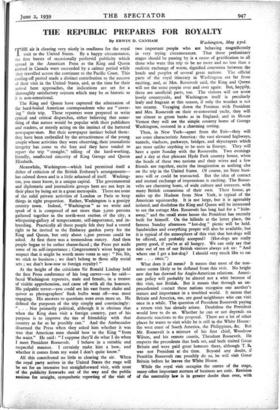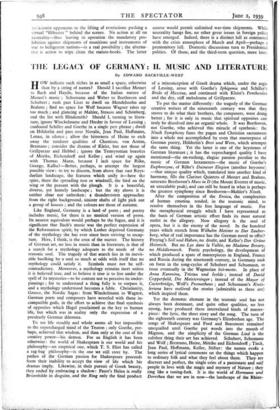THE REPUBLIC PREPARES FOR ROYALTY
By ERWIN D. CANHAM
Washington, May 23rd.
THE air is clearing very nicely in readiness for the royal visit to the United States. By a happy circumstance, the first bursts of occasionally perfervid publicity which spread in the American Press as the King and Queen arrived in Canada were succeeded by a calmer period while they travelled across the continent to the Pacific Coast. This cooling-off period made a distinct contribution to the success of their visit in the United States, and, as the time for their arrival here approaches, the indications are set for a thoroughly satisfactory sojourn which may be as historic as it is non-sensational.
The King and Queen have captured the admiration of the hard-boiled American correspondents who are " cover- ing " their trip. These reporters were prepared to write cynical and critical dispatches, either believing that some- thing of that nature would be popular with their publishers and readers, or merely acting on the instinct of the battered newspaper-man. But their newspaper instinct belied them: they have been enthralled by the attractiveness of the young couple whose activities they were observing, their journalistic integrity has come to the fore and they have tended to report the trip " straight," telling of the hard-working, friendly, unaffected sincerity of King George and Queen Elizabeth.
Meanwhile, Washington—which had permitted itself a dither of criticism of the British Embassy's arrangements-- has calmed down and is a little ashamed of itself. Washing- ton, you must know, is a unique capital. The governmental and diplomatic and journalistic groups here are not kept in their place by being set in a great metropolis. There are none of the solid private activities of London or Paris to keep things in right proportion. Rather, Washington is a gossipy country town. Indeed, " Washington " as we write and speak of it is composed of not more than 5,000 persons gathered together in the north-west section of the city, a whispering-gallery of temperament, self-importance, and in- breeding. Practically all these people felt they had a vested right to be invited to the Embassy garden party for the King and Queen, but only about 1,3oo persons could be asked. At first there was a tremendous outcry. And then people began to be rather shame-faced ; the Press put aside some of its self-importance ; Congressmen's wives began to suspect that it might be worth more votes to say: " No, Sir, we stick to business ; we don't belong to those silly social sets ; we don't kow-tow to foreign royalty! "
At the height of the criticisms Sir Ronald Lindsay held the first Press conference of his long career—so he said— faced Washington reporters, male and female, in a tremor of visible apprehension, and came off with all the honours. His palpable terror—you could see his vast frame shake and quiver as photographers' flash bulbs went off—was most engaging. His answers to questions were even more so. He defined the purposes of the trip simply and convincingly: . . . Not primarily political, although it is obvious that when the King does visit a foreign country, part of his purpose is to improve the ties of friendship with that country as far as he possibly can." And the Ambassador disarmed the Press when they asked him whether it was true that American men should bow to the King " from the waist." He said: " I suppose they'll do what I do when I meet President Roosevelt. I behave in a suitable and respectful manner. I certainly make him a bow, and whether it comes from my waist I don't quite know."
All this contributed no little to clearing the air. When the royal party arrives in the United States the stage will be set for an intensive but straightforward visit, with most of the publicity fireworks out of the way and the public anxious for straight, sympathetic reporting of the visit of two important people who are behaving magnificently in very trying circumstances. That these preliminary stages should be passing by is a cause of gratification to all those who want this trip to be no more and no less than a realistic exchange of warm, dignified courtesies between the heads and peoples of several great nations. The official parts of the royal itinerary in Washington are far from exciting, and, as Mrs. Roosevelt said, the King and Queen will see the same people over and over again. But, happily, there are unofficial parts, too. The visitors will see some lovely countryside, and Washington itself is peculiarly leafy and fragrant at this season, if only the weather is not too steamy. Voyaging down the Potomac with President and Mrs. Roosevelt on their re-converted yacht, they will see almost as green banks as in England, and in Mount Vernon they will see the simple country home of George Washington, restored in a charming setting.
Then, in New York—apart from the Fair—they will see some characteristic America: the vast elevated highways, tunnels, viaducts, parkways, bridges, and skyscrapers which are most unlike anything to be seen in Europe. They will have a quiet Sunday with the Roosevelts. Two evenings and a day at that pleasant Hyde Park country house, when the heads of these two nations and their wives and a few friends are together, excite the imagination as nothing else on the trip in the United States. Of course, no State busi- ness will or could be transacted. But the idea of contact and mutual exchange of impressions is exciting. The Roose- velts are charming hosts, of wide culture and interests, with many British connexions of their own. Their house, 4o miles up the Hudson from New York, is typical of the American squirearchy. It is not large, but it is agreeably isolated, and doubtless the King and Queen will be interested to see the cottage Mrs. Roosevelt has long had for a " hide- away," and the small stone house the President has recently built for himself. On the hillside at the latter place, the famous Sunday afternoon " hot-dog " picnic will be held.
Sandwiches and everything proper will also be available, but it is typical of the atmosphere of this visit that hot-dogs will be offered, and probably accepted! (Hot-dogs are really pretty good, if you're at all hungry. We can only say that nine out of ten of our British visitors always ask us: " And where can I get a hot-dog? I should very much like to eat one . . . once.") What does it all mean? It means that most of the non- sense seems likely to be deflated from this visit. No bright new day has dawned for Anglo-American relations. Ameri- can policy will probably be altered not a whit because of this visit, nor British. But it means that through an un- precedented contact these nations recognise one another's stature and importance in a troubled world. It means that Britain and America, too, are good neighbours who can visit once in a while. The question of President Roosevelt paying a return visit has already arisen. Doubtless the President would love to do so. Whether he can or not depends on domestic reactions to the proposal. There are a lot of other places he wants to visit while he is still in the White House: the west coast of South America, the Philippines, &c. But Mr. Roosevelt is a mixture of his first chief, Woodrow Wilson, and his remote cousin, Theodore Roosevelt. He respects the precedents that both set, and both visited Great Britain and were paid great honours there, although T. R.
was not President at the time. Beyond any doubt, if Franklin Roosevelt can possibly do so, he will visit Great Britain before he leaves the White House.
While the royal visit occupies the centre of the stage, many other important matters of business are astir. Revision of the neutrality law is in greater doubt than ever, with Iso.a..ionist opponents to the lifting of restrictions pushing a virtual "filibuster " behind the scenes. No action at all on neutrality—thus leaving in operation the mandatory pro- hibition against shipments of munitions and instruments of war to belligerent nations—is a real possibility ; the alterna- tive is action to wipe clean the statute-books. The latter course would permit unlimited war-time shipments. Whip neutrality hangs fire, no other great issues in foreign policy have emerged. Indeed, there is a distinct lull as contrasted with the crisis atmosphere of March and April—perhaps a premonitory lull. Domestic discussions turn to Presidential politics. Of those, and the third-term question, more later.











































 Previous page
Previous page